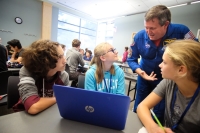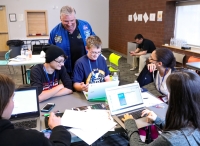Go For Launch!
Durham County Library, N.C.
Innovation Synopsis
Durham County Library, Durham Library Foundation and Higher Orbits brought Go For Launch! to hundreds of teens at low or no cost. Teens worked with an astronaut to design experiments. In late 2018, the winning team attended the launch of SpaceX Falcon 9, which sent their experiment to be conducted in space on the International Space Station.
Challenge/Opportunity
Go For Launch! helped area young people discover pathways to STEAM careers through hands-on learning. Community donors made it possible to remove financial barriers to access so that no one was turned away from participating due to cost. Five of the six programs, which typically cost over $200 per participant, were offered entirely free of charge; one was offered at $25 per participant. Go For Launch! created access to high-quality, inspiring programming to ignite interest and build STEAM skills in local teens.
Key Elements of Innovation
Teens grades eight through 12 participated in one of six, three-day programs on human spaceflight. Teens worked in small teams with an astronaut and other STEAM experts to design experiments. Teams competed for the chance for their experiment to be launched to the International Space Station and conducted in microgravity. Teens on the winning team were sponsored to be on-site at Kennedy Space Center, Fla., to watch their experiment launch to the International Space Station aboard a Falcon 9 rocket on the SpaceX CRS-16 mission.
Achieved Outcomes
Go For Launch! brought the exhilarating reality of human spaceflight to local teens. A mother of three girls who participated said, “My girls were able to work through complex real-life problems, meet astronauts and learn in diverse groups what it’s like to be challenged as a team.” She described dinner table conversations about math and experiments for the International Space Station. In late 2018 the winning team witnessed their experiment, “Radiotrophic Fungi: A Possible Radiation Barrier,” launched into space.



